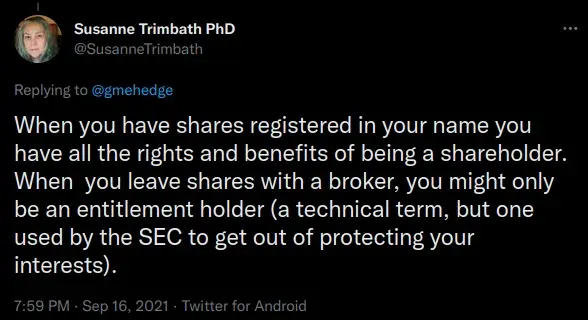Migration note: This post originally appeared on Reddit/Superstonk in April of 2022.
👋️🦍️⌚️📖️🍆️⚖️
Hey apes, time to RTFL: Read The Fucking Law. (That’s the law they use to fuck us)
Can’t read? No problem, I’ll TACR it for you. Don’t like my TACR? No problem, read it yourself. Can’t read AND don’t like my TACR? Find a lawyer and get them to read it for you.
First, disclaimers - I’m a big proponent of DRSing shares. I’ve been holding since Jan 2021, DRS’d in September, 99% DRS’d since October. I am not a lawyer, just reading (#blessed)
Let’s start with where I started, the Queen herself:

https://twitter.com/SusanneTrimbath/status/1438653922449641472
Interesting enough on its own, I’d say. I like having rights and protections. But what is this “entitlement holder”?
The answer lies in the Uniform Commercial Code, in Article 8 on investment securities:

https://www.law.cornell.edu/ucc/8/8-102

This part bears quoting in text - Entitlement holder: person having a security entitlement against the securities intermediary (broker).
So while an “entitlement” may at first sound like an absolute thing, in actuality, it is specifically “against” your broker. It just means your broker owes you a share.
Hmm, what does that remind me of?

That’s as good as shares, sir. That’s a share IOU
Ok, so if an “entitlement holder” only has a “security entitlement” (share IOU from their broker), then how can someone know if they have a share IOU or a real share? What is a real share? Not an “entitlement” to a security, but the “security” itself?

Uhhh… many word, such read, wut mean?
TACR: To be a security, something has to not fall under the exceptions in 8-103, and it has to meet all three criteria (i), (ii), and (iii).
The exceptions in 8-103 carve out things which explicitly are not securities, like options, commodity contracts, things which don’t trade on markets, etc. None of them seem to apply to GME, but you can read it for yourself.
Now, to be a security, each of (i), (ii), and (iii) must be true. Let’s look at (i) specifically:
(i) which is represented by a security certificate in bearer or registered form, or the transfer of which may be registered upon books maintained for that purpose by or on behalf of the issuer;
So to be a security, this must be true, which means at least one of these things:
- It is represented by a security certificate in bearer form
- It is represented by a security certificate in registered form
- The transfer of the thing is registered upon the books, maintained for the purpose of registration, by the issuer (GameStop) or for the issuer (i.e. by their transfer agent, Computershare)
So, if you do not have a certificate (which is hard to come by these days, pretty much no one deals in stock certificates anymore), and you are not registered on the books maintained by Gamestop/Computershare, then you do not have a GME security. Full stop.
How does one get onto these books that are maintained by GameStop’s transfer agent Computershare? (Spoiler: It’s through Computershare)
Honestly, that should be the end of this post right there.
Unfortunately, due to certain derivative repping shills, I also have to talk about why a share IOU is not just as good as a share.

https://www.law.cornell.edu/ucc/8/8-503
An entitlement holder’s property interest with respect to a particular financial asset under subsection (a) is a pro rata property interest in all interests in that financial asset held by the securities intermediary,
“Pro rata” means proportional. “To the extent necessary for a securities intermediary to satisfy all security entitlements” means when push comes to shove.
If your broker doesn’t have enough shares for all the IOUs they’ve handed out, you’ll have to make do with fewer shares than you have share IOUs. If the DTC doesn’t have enough shares for all the share IOUs they’ve handed out, you’ll have to make do with fewer shares than you have share IOUs.
Edit to add this paragraph: I’ve responded to a comment saying “of course, all shares are pro-rata”. To be clear, there is a difference between a pro-rata interest in the issuer (what we assume a share means), and a pro-rata interest in “that financial asset held by the security intermediary” (what this law states). The basis for determining this pro-rata proportion is not the company’s issued/authorized/outstanding shares, but the potentially much larger number of shares owed by the intermediary to its entitlement holders. As an example, if a broker sold 1000 shares, including 100 to you, but only received and holds 500, you have property interest in just 50 shares, not the 100 you see neatly credited to your account.
But that’s just my interpretation, what do I kn-- huh? what’s that SEC staff?

https://www.sec.gov/news/speech/2007/spch101607ers.htm
Alright, let’s wrap this post up. To summarize:
- A real share (security) is registered on the books maintained for the issuer, by their transfer agent (or is certificated)
- A share IOU from your broker (security entitlement) is what you actually have when your “shares” are not registered
- A share IOU is not as good as a share. It is a pro-rata property interest in real shares held by the DTC/Cede & Co.
- If you want to have a share instead of be owed a share, you gotta ask your broker to deliver what they owe you

All along, we said the secret ingredient was crime. And there is a lot of crime. But there is also a non-trivial amount of technically legal non-delivery due to holders not RTFL and not asking for delivery of what they paid for and are owed.
PS. Special shout outs to u/millertime1216 and u/mistakesnmoney for motivating me to write this. 🦍️❤️🦍️. Shout out to DRS haters for frustrating me enough to go look up all these laws. To any shills coming for me in the comments: hope you’re not selling covered calls, those pro-rata shares may not cover you when shit hits the fan.


Great write up! I appreciate you posting this here, it really sums it up in a logical way 👊💜👊